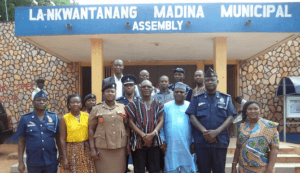La Nkwantanang-Madina Municipal Assembly is top performing district in 2016
 The La Nkwantanang-Madina Municipal Assembly (LaNMMA) in the Greater Accra Region has been adjudged the best performing District Assembly for 2016 with a score of 77.8 per cent
The La Nkwantanang-Madina Municipal Assembly (LaNMMA) in the Greater Accra Region has been adjudged the best performing District Assembly for 2016 with a score of 77.8 per cent
Tema Metropolitan Assembly (TMA) placed second with 77.6 per cent, while the bottom most position, 216th went to the North Tongu in the Volta Region with a score of 40.9 per cent.
The District League Table (DLT), was organised by the Centre for Democratic Development (CDD) Ghana and the United Nations Children’s Fund (UNICEF) Ghana in collaboration with the Ministry of Local Government and Rural Development (MLGRD).
It was aimed at increasingd accountability between decision-makers and citizens, which is crucial in Ghana for improving both the demand for and supply of quality public service delivery in education, health, security, rural water, sanitation and governance.
The DLT, which was started in 2014, is an independent tool for promoting social accountability, shows national progress toward delivering development across Ghana’s 216 Districts and is produced on an annual basis.
The scores so far showed both the top and the bottom scores have improved slightly since 2015.
The national average is 58.9 compared with the average of 56 in 2015.
With an eventual target of a score of 100 per cent, it is clear that the majority of the districts are still far from this goal. The report said.
The top district in each region included Ejura Sekyeredumase Municipal in Ashanti, LaNMMA in Greater Accra, Jaman South in Brong Ahafo, Bawku Municipal in Upper East and Bibiani Anhwiaso Bekwai in Western Regions.
The rest are Sissala East in the Upper West, Awutu Senya East Municipal in the Central Region, Nsawam-Adoagyiri Municipal in the Eastern, Yendi Municipal in Northern and Kpando in the Volta Regions.
The most improved district was the Wa East in the Upper West Region, which managed to increase its score by 27 percentage points.
Alhaji Collins Dauda, Minister of Local Government and Rural Development, in speech read on his behalf said, it was his expectation that the vital and essential information provided by the third edition of the DLT, would serve as a spring-board for useful discussions among citizens, civil society and public officials on what to do to enhance the assemblies delivery of public services.
He lauded CDD Ghana and UNICEF for working hard to develop the district ranking, which according to him, must generate a healthy competition among Metropolitan, Municipal and District Assemblies as they strive to work hard to improve the quality of services to their people.
Ms Susan Ngongi, UNICEF Representative to Ghana said there was the need for government to ensure that districts were equipped to facilitate their development.
She said: “We have gotten to the point where we have to interrogate data to accelerate national development.”
Ms Sarah Hague of UNICEF Ghana gave an overview of the DLT and said it was expected that through the use of its results, citizens would become increasingly informed and empowered to understand how development was progressing across the country.
Dr Franklin Oduro of the CDD Ghana presented the findings of the 2016 DLT and said a key area of improvement had been that of sanitation.
“While no district in Ghana is still yet certified as Open Defecation Free, with the new data available we can see that several districts are making good progress by certifying individual communities, such as Nandom and Lawra in the Upper West Region and Mion in the Northern Region.
“Across the country as a whole, those districts at the top of the ranking are doing almost twice as well as the lowest ranked districts, although the gap has showed signs of narrowing this year.”
An elated Mr Franklin Anku, the Chief Executive of the LaNMMA, said, what the Assembly had achieved was through team work and good leadership and dedicated the award to the staff.
The launch of the 2016 DLT was chaired by Professor Esther Ofei-Aboagye, Vice Chairperson of the National Development Planning Commission.
Source: GNA
